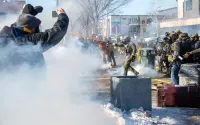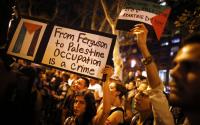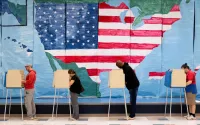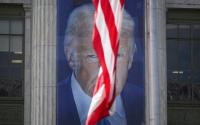Burning With Anger: Iraqis Infuriated by New Flag That Was Designed in London
by Patrick Cockburn in Baghdad and David Usborne in Baghdad
For many Iraqis it was the final insult. Again and again they expressed outrage yesterday that Iraq's United States-appointed and unelected leaders had, overnight, abolished the old Iraqi flag, seen by most Iraqis as the symbol of their nation, and chosen a new one.
"What gives these people the right to throw away our flag, to change the symbol of Iraq?" asked Salah, a building contractor of normally moderate political opinions. "It makes me very angry because these people were appointed by the Americans. I will not regard the new flag as representing me but only traitors and collaborators."
 'WHAT GIVES THESE PEOPLE THE RIGHT TO THROW AWAY OUR FLAG?'A model of the new Iraqi flag as published in Iraqi al-Sabah newspaper. (AFP/HO) 'WHAT GIVES THESE PEOPLE THE RIGHT TO THROW AWAY OUR FLAG?'A model of the new Iraqi flag as published in Iraqi al-Sabah newspaper. (AFP/HO) |
When, as expected, the controversial new flag is hoisted inside the security of the Green Zone in Baghdad today, there is little prospect that the flag will be fluttering over other Iraqi cities. When security officers at the United Nations undertake the daily ritual this morning of raising the standards of the 191 member countries up the white poles arrayed outside UN headquarters in New York's First Avenue, for Iraq it will be the familiar flag of Saddam Hussein's rule that is unfurled.
"So far, we haven't received anything about this from Baghdad," said Igor Novichenko, who is in charge of such matters in the UN's protocol unit. For now, he added, the old Iraqi flag of green and black, with "God is Great" in Arabic script across it, will retain its place outside UN headquarters.
That is not to say that the new version may not be fluttering on First Avenue one day. There are no great formalities involved in changing a country's flag. All that is required is for the mission of that country in New York - and the Iraqi mission is still open - to inform the UN of the new design.
But in Iraq greater problems loom where insurgents will be able to strengthen their patriotic credentials by sticking with the old and popular Iraqi flag and portraying the new one as a sign of subservience to foreign occupiers.
Already anti-US guerrillas are adopting the old red, white and black banner as their battle flag, tying it to their trucks and sticking it in the ground where they have their positions. This blend of nationalism and religion has proved highly successful in spreading resistance to the occupation.
It is increasingly unlikely that the Allies will have any legitimate Iraqi authority to whom they can transfer power on 30 June, as President George Bush has promised.
As the security situation deteriorates in Baghdad, Iraqis are more often refusing to reveal their family names when interviewed. Jassim, standing behind the counter in his grocery shop, said: "That flag is not Saddam's flag. It was there before Saddam and it represents Iraq as a country. The whole world knows Iraq by its flag."
A further reason for popular anger is that many Iraqis are convinced that their new flag is modeled on the Israeli flag. It is white with two parallel blue strips along the bottom representing the Tigris and Euphrates rivers with a yellow strip in between symbolizing the Kurds. Above the stripes is a blue crescent to represent Islam. Iraqis say the blue stripes are suspiciously like those on the Israeli flag. They also ask why the Kurds have a stripe in the new flag but not the 80 per cent of Iraqis who are Arabs. Could it be because the Kurds are the only Iraqi community fully supporting the US?
The old Iraqi flag was modified but was otherwise unchanged by Saddam Hussein. It had red and black bands across the top and bottom and three green stars on the white stripe separating them. Just before the 1990-91 Gulf War the words "Allahu Akbar",God is Great, were added to boost the religious credentials of Saddam Hussein's secular regime.
The flag won the loyalty of many Iraqis who did not support the old regime. Dhurgham, a 23-year-old student, said: "We cheered Iraqi footballers under that flag for a long time. I feel it represents me as an Iraqi. I don't like this new flag. It does not look Iraqi. It is more like the Turkish or Israeli flags. The main reason I don't like it is that it comes from the Americans."
When the idea of getting a new flag was first talked about last year, it stirred up strong feelings against change. But the Iraqi Governing Council, made up of former opponents of Saddam Hussein and Iraqis in exile during his rule, has a well-established reputation for being wholly out of touch with Iraqi opinion. The council approved the new flag, only asking the artist to make the crescent a deeper blue.
"This is a new era," said Hamid al-Kafaei, the spokesman for the Iraqi Governing Council yesterday. "We cannot continue with Saddam's flag." The new flag is the work of an Iraqi artist resident in London called Rifat Chadirji whose design was the best of those considered. He is also the brother of Nassir al-Chaderchi, the chairman of the IGC committee charged with choosing a new flag for Iraq. "I had no idea about a competition to design the flag. My brother just called me and asked me to design a flag on behalf of the IGC. Nobody told me about a competition," Mr Chadirji told The Independent yesterday.
A cogent reason for changing the flag was that it was said to be unacceptable to Kurds who saw it as a symbol of oppression. But Mahmoud Othman, an independent Kurdish member of the governing council, said yesterday that the leadership should have waited until a parliament was elected before a decision on the flag was made.
* American aircraft and tanks attacked Fallujah last night, just hours after a US deadline expired for rebels to hand over their heavy weapons.
In the holy city of Najaf, 64 fighters loyal to the radical Shia cleric Moqtada Sadr were killed hours after Washington issued an ultimatum to him to clear his militia and their arms from mosques there, a US spokesman said.






